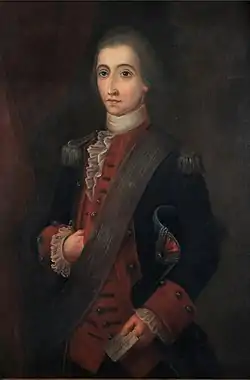Tomás de Figueroa
Tomás de Figueroa y Caravaca (1747 – 1811) was a Spanish soldier was active in the military outpost of Valdivia and later in Santiago as a royalist during the early phase of the Chilean struggle for independence. He was born in Estepona near Málaga in southern Spain. A soldier by profession he had to migrate Chile in 1775 after having killed a man in a duel in Spain. In late 1792 he led Spanish forces that suppressed a Huilliche uprising around Río Bueno and Futahuillimapu in southern Chile.[1] After leading a mutiny to restore colonial order in Santiago on April 1, 1811 he was summarily executed on the orders of pro-independence leader Juan Martínez de Rozas.
Tomás de Figueroa | |
|---|---|
 | |
| Personal details | |
| Born | 1747 Estepona, Spain |
| Died | April, 1811 (aged 63–64) Santiago, Captaincy General of Chile, Spanish Empire |
| Nationality | Castilian |
| Mother | María Caravaca y Ollán |
| Father | Gonzalo de Figueroa |
| Occupation | Soldier |
| Known for | Suppression of the 1792 Huilliche uprising Figueroa mutiny |
References
- Barros Arana, Diego (2000) [1886]. "Capítulo XVII". Historia General de Chile (in Spanish). VII (2 ed.). Santiago, Chile: Editorial Universitaria. pp. 66–69. ISBN 956-11-1535-2.CS1 maint: ref=harv (link)
This article is issued from Wikipedia. The text is licensed under Creative Commons - Attribution - Sharealike. Additional terms may apply for the media files.
